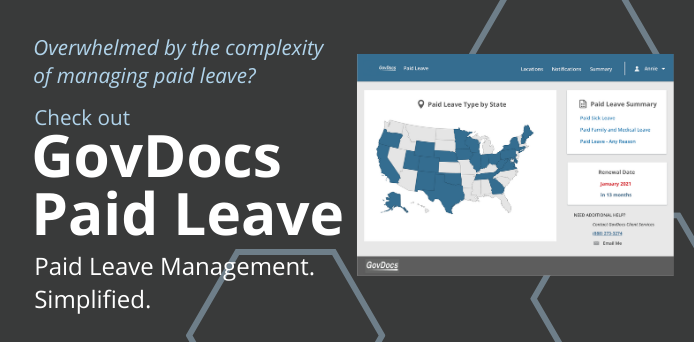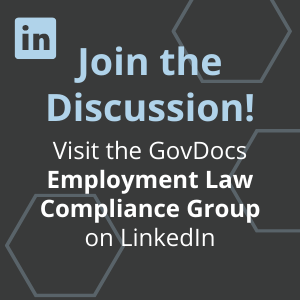EMPLOYMENT LAW NEWS
The State of Diversity, Equity and Inclusion Laws Today
By Kris Janisch
Published April 13, 2022
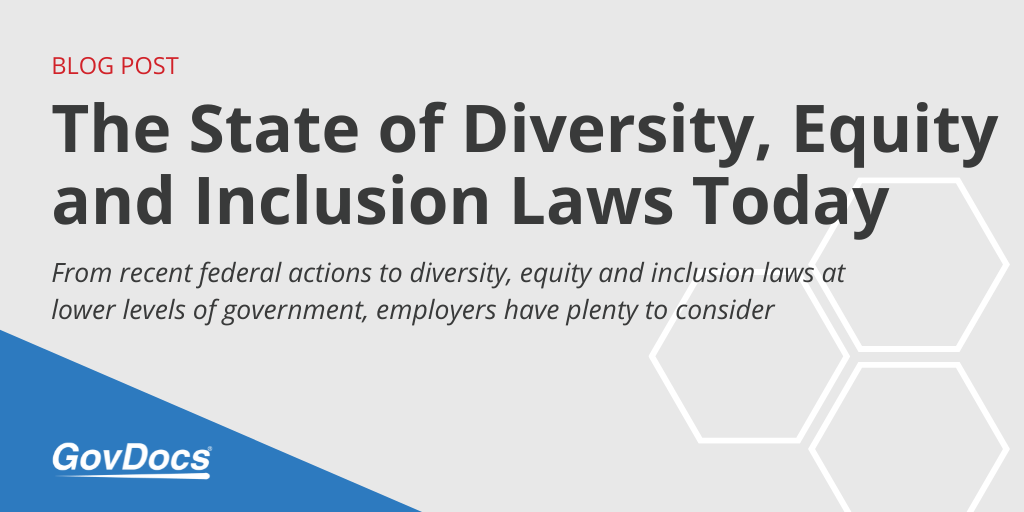
With laws related to diversity, equity and inclusion now cropping up at the federal level, employers may see additional compliance requirements.
Employment law legislation around diversity, equity and inclusion continues to gain steam across the U.S.
And that includes the federal government, which recently saw three new developments regarding these topics. President Biden has made it official policy of his administration to “cultivate a workforce that draws from the full diversity of the nation.”
EEOC on Discrimination Filings
The White House recently announced it will support transgender, nonbinary and gender nonconforming people through efforts by the Equal Employment Opportunity Commission (EEOC), Department of Homeland Security and Social Security Administration.
Of note for employers, the EEOC will give people the option to select a nonbinary “X” gender marker during the voluntary self-identification questions that are part of the intake process for filing a charge of discrimination.
“The addition of a nonbinary gender marker to the EEOC’s charge intake process will be an important step to promote greater inclusion for members of the LGBTQI+ community,” EEOC Chair Charlotte A. Burrows said in a statement. “To advance our mission to prevent and remedy employment discrimination, we must serve all workers, including those who do not identify as male or female. Our public-facing forms should make clear that we respect that diversity.”
U.S. House on CROWN Act
Meanwhile, the U.S. House of Representatives in March 2022 passed a CROWN (Creating a Respectful and Open World for Natural Hair) Act bill. These laws, which have been enacted at lower levels of government, prohibit employment discrimination based on hairstyles typically associated with Black people, including:
- Braids
- Twists
- Locks
- Textured hair
- Afros
However, it may have a harder time finding footing in the U.S. Senate.
Several states have passed CROWN laws, including California, New York, New Jersey and Virginia.
Ending Forced Arbitration of Sexual Assault and Sexual Harassment Act
In terms of changes that are already in effect, there’s the Ending Forced Arbitration of Sexual Assault and Sexual Harassment Act. The measure amended federal law to bar forced arbitration agreements regarding claims of sexual assault or sexual harassment in the workplace.
It also bans waivers of the right to bring these types of claims forward and allows employees who allege sexual assault or harassment to have the dispute decided by a court, even if they previously signed a forced arbitration agreement.
Taken together, these actions are indicative of a larger push for new or updated employment laws related to diversity, equity and inclusion.
Diversity, Equity and Inclusion Laws Today
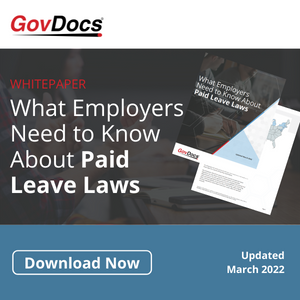 While federal action has been slower to develop, many state and local jurisdictions have tackled these issues of late.
While federal action has been slower to develop, many state and local jurisdictions have tackled these issues of late.
But there has been pushback. In California, a judge on April 1, 2022, struck down a law that required employers to have a member of their board of directors from an “underrepresented community” by the end of 2022.
Despite that situation, many lawmakers have been active with legislation promoting diversity, equity and inclusion in the workplace.
With the exception of Mississippi, every state now has a pay equity law on the books, which prohibit employers from discriminating against workers based on:
- Age
- Race
- Creed
- Color
- Sex
- Sexual orientation
- Gender identity
- National origin
- Religion
- Disability
Meanwhile, the #MeToo movement has also had a hand in new diversity, equity and inclusion laws, including harassment-prevention training, expanded protections under equal pay laws, salary history bans and more.
But in addition to these laws, many large employers are taking it upon themselves to make workplaces more inclusive.
How Employers Are Handling Diversity, Equity and Inclusion
In July 2021, GovDocs brought more than a dozen HR and compliance professionals together for a wide-ranging discussion on diversity, equity and inclusion. The Compliance and Coffee virtual roundtable offered participants — representing some of the largest employers in the country — a chance to talk specifically about their company’s efforts.
One employer holds quarterly calls, webinars and guest speakers and has a a vice president of diversity equity and inclusion.
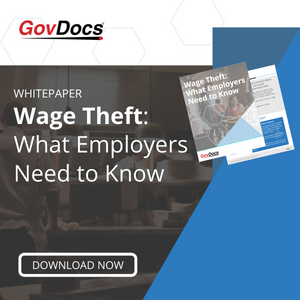 Another participant said her company has an entire department dedicated to diversity and inclusion, which includes VPs, managers and analysts. The business has also revised company policies to remove gender-specific pronouns — more than 500 policy and form revisions were made to make the pronouns nonbinary.
Another participant said her company has an entire department dedicated to diversity and inclusion, which includes VPs, managers and analysts. The business has also revised company policies to remove gender-specific pronouns — more than 500 policy and form revisions were made to make the pronouns nonbinary.
However, those types of changes can create issues elsewhere, notably with government forms. New York has a law that allows for nonbinary indicators on driver’s licenses, which makes I-9 verification more difficult. And the same is true for EEO-1 reporting, and insurance and medical information.
Still, the push for diversity, equity and inclusion takes many forms. Companies have different philosophies in getting the word out to employees.
Some send smaller, bite-sized items, including short videos and companywide emails. Others hold quarterly training sessions, provide eLearning modules and post intranet articles. One attendee said her company has themed months, Black history or a focus on women’s rights, for example.
One company last year started a Diversity, Equity, Inclusion and Access (DEIA) initiative, looking to establish training programs and make changes to company policy and recruiting efforts. A few months later, the business has seen an uptick in conversations regarding race, politics, social issues, etc. They’re trying to create an atmosphere where employees can discuss these issues in an open and safe environment.
Conclusion
With laws related to diversity, equity and inclusion now cropping up at the federal level, employers may see additional compliance requirements.
And companies operating in locations across the U.S. should review local laws, ensure they align with company policies and procedures, and act accordingly.
This Employment Law News blog is intended for market awareness only, it is not to be used for legal advice or counsel.
Keep Informed
with GovDocs Employment Law News
What is GovDocs?
GovDocs simplifies employment law compliance for large, multi-jurisdiction employers in the U.S. and Canada. The GovDocs software platform integrates three solutions in one convenient place to help you master the employment laws impacting your business. Whether you manage a postings, minimum wage or paid leave program, our products cut through research time, provide proactive insights into the everchanging landscape of employment laws and reduce the risk of noncompliance. The company is headquartered in St. Paul, Minn.
The GovDocs Poster Store simplifies posting compliance for employers with less than 30 locations across all industries, offering a variety of posting products to meet your labor law compliance needs.

